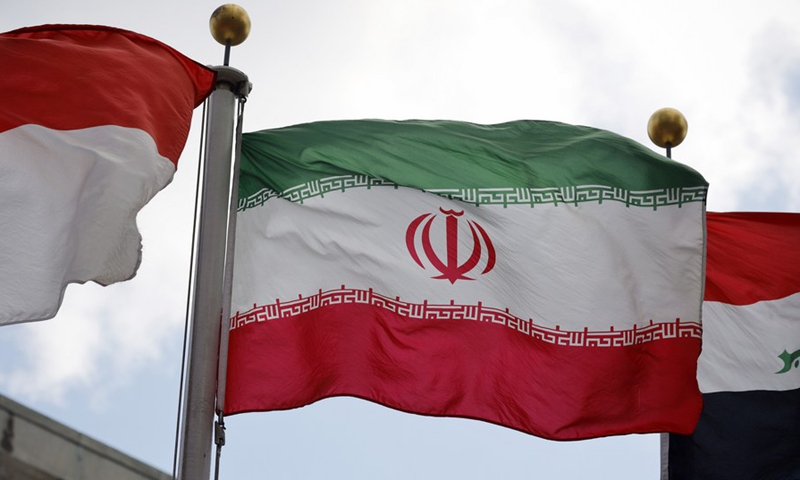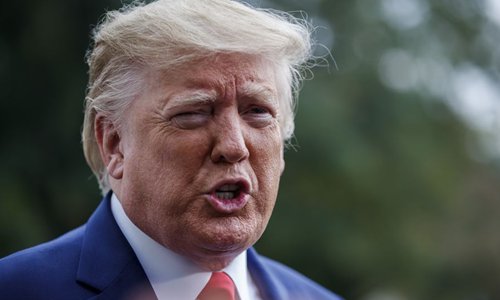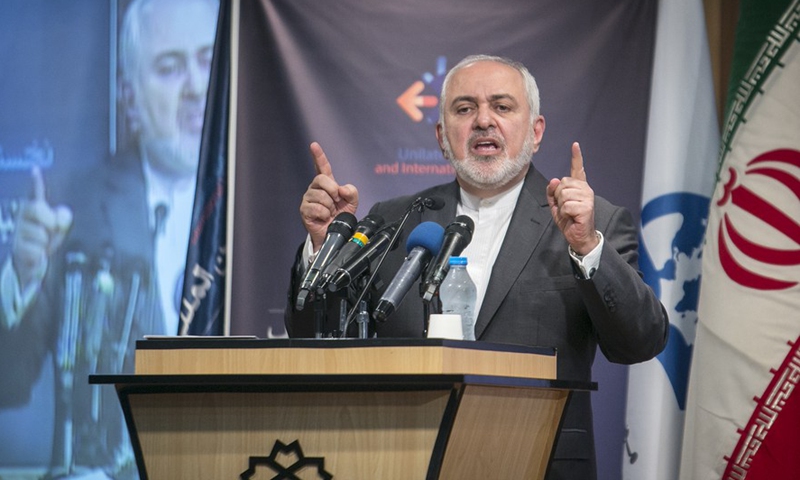US announces Iran sanctions as its unilateral attempt at UN widely ignored

An Iranian flag is pictured at the United Nations headquarters in New York, Jan. 8, 2020. (Xinhua/Li Muzi)
The United States on Monday announced fresh sanctions and measures against entities and individuals related to Iranian nuclear and conventional weapons programs, a move to support its self-claimed UN snapback sanctions widely ignored by the international community.
President Donald Trump said that he had issued an executive order to impose sanctions and export controls on more than two dozen entities and individuals "that support Iran's nuclear, missile, and conventional arms-related activities."
"The Executive Order I am issuing today blocks the property, and interests in property, in the United States of those who contribute to the supply, sale, or transfer of conventional arms to or from Iran, as well as those who provide technical training, financial support and services, and other assistance related to these arms," Trump said in a White House statement.
Secretary of State Mike Pompeo, standing with other senior US officials in a press conference, said that the United States had also designated Venezuelan President Nicolas Maduro for his alleged ties with Tehran on conventional arms-related activities.

US President Donald Trump speaks to reporters before leaving the White House in Washington D.C., the United States, on Oct. 25, 2019. (Photo by Ting Shen/Xinhua)
Iran's Ministry of Defense and Armed Forces Logistics, Iran's Defense Industries Organization and its director, as well as individuals and entities associated with the Atomic Energy Organization of Iran, are also on the sanction list.
Iranian Foreign Minister Mohammad Javad Zarif Monday dismissed US sanctions as "nothing new," US media reported.
"The United States has exerted all the pressure it could on Iran. It had hoped that these sanctions will bring our population to their knees. It didn't," Zarif said during a think tank event.
This latest move came shortly after the Trump administration's Saturday claim that all pre-2015 UN sanctions against Iran had been restored according to the "snapback" mechanism under UN Security Council Resolution 2231, which endorsed the 2015 Iran nuclear deal.
The United States unilaterally invoked the "snapback" on Aug. 20 after its failed and isolated attempt in the UN Security Council to extend the arms embargo against Tehran that expires next month.

Iranian Foreign Minister Mohammad Javad Zarif speaks during the international conference on "Unilateralism and International Law" in Tehran, Iran, Oct. 21, 2019. (Photo by Ahmad Halabisaz/Xinhua)
The overwhelming majority of Security Council members, however, asserted that the United States has no right to invoke the "snapback" mechanism as the country is no longer a participant following its withdrawal from the Iran nuclear deal in May 2018.
Zhang Jun, China's permanent representative to the United Nations, on Sunday wrote a letter to the president of the Security Council and UN secretary-general, expressing opposition to the US unilateral announcement on the return of the UN sanctions on Iran on Saturday.
In his letter, Zhang said that the United States unilaterally withdrew from the Joint Comprehensive Plan of Action (JCPOA) in May 2018, and is no longer a JCPOA participant. Therefore, it is illegitimate for the United States to demand the Security Council invoke the snapback mechanism.
High Representative of the European Union for Foreign Affairs and Security Policy Josep Borrell denied on Sunday the unilateral announcement made by the United States to resume UN sanctions on Iran.
Borrell said the United States unilaterally withdrew from the Iran nuclear deal in 2018 and therefore "cannot initiate the process of reinstating UN sanctions under the UN Security Council resolution 2231."
The Russian Foreign Ministry said in a statement Sunday that to claim that UN sanctions against Iran have been restored is "wishful thinking," urging the US side to "have the courage to finally face the truth and stop speaking on behalf of the UN Security Council."
